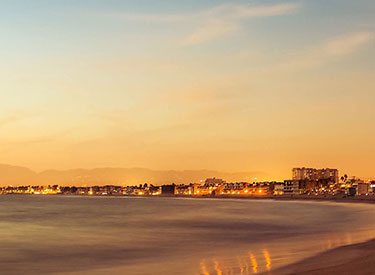


Many European countries are placing a strong emphasis on enhancing accessibility, aiming to provide a more convenient and enjoyable holiday experience for travellers with disabilities. From wheelchair-friendly public transport systems to barrier-free access to popular attractions, these are our top seven wheelchair-friendly destinations in Europe:
There is an ever-growing network of beaches throughout Greece where SEATRAC facilities, which provide wheelchair access to the water free of charge, have been installed. In each location, these are complemented with accessible parking and changing room facilities, making a wheelchair-friendly beach-hopping holiday very achievable. The Cyclades Island of Syros is an increasingly popular choice for wheelchair users – along with four SEATRAC-equipped beaches, there are many accommodation options with wheelchair accessible rooms. The steep, ancient streets of the island’s twelfth-century hilltop town, Ano Syros, can be explored by wheelchair users, thanks to the installation of modern elevators.
Other popular Greek islands that offer SEATRAC facilities include Corfu (nine beaches), Mykonos (three), Cyprus (ten) and Kefalonia (one). See a complete list of the beaches in Greece that offer SEATRAC facilities.
Whether it’s taking in a concert at Amsterdam’s Royal Concert Hall, viewing paintings by the grand masters at the Rijksmuseum, or taking in the panoramic views from the rooftop terrace of the A’DAM Toren tower, Amsterdam is particularly well equipped as an accessible destination. There are several wheelchair accessible connection options between Schiphol Airport and the city, and most footpaths around the city are equipped with access ramps. A canal boat tour is a great way to see the city whilst saving your wheels and/or battery.
The Slovakian capital is one of the most wheelchair-accessible cities in Eastern Europe, not to mention one of the most beautiful. Despite being many centuries old, Bratislava Castle is mostly wheelchair accessible, although some assistance may be required to navigate the path which leads from the Old Town to the castle’s hilltop location. Many of the restaurants and cafes that line the streets and squares of Bratislava’s Old Town offer outdoor seating during the summer months, and although many streets are cobbled, centuries of use have worn them down sufficiently smooth that they are relatively friendly to wheelchair use. Some trams and trolleybuses are wheelchair accessible, and many attractions, such as the Slovak National Gallery, offer free entry upon presentation of an international disability card.
For more information on planning an accessible holiday in Bratislava, visit Visit Bratislava.
Many of the city’s most popular attractions are accessible to wheelchair users, from the European Museum of Modern Art (MEAM) to the incredible art and architecture of Gaudí’s famous Park Güell. Football fans can immerse themselves in one of the world’s great football clubs at Barça Museum, while chocoholics can take a journey through the story of chocolate at the Museu de la Xocolata, and beachgoers can cool off at a number of the city’s wheelchair friendly beaches, which are equipped beach wheelchairs, accessible bathrooms and volunteer assistance. The city is serviced by more than 1000 fully accessible buses, the majority of metro stations are step-free, and the Montjuïc Cable Car offers easy access to some of the best views in the city.
For more information on planning an accessible holiday in Barcelona, visit Barcelona Tourism.
Austrian cities such as Salzburg and Vienna are actively focused on ensuring “barrier-free” access to tourist attractions for all people with disabilities, from discounted fares on their accessible public transport networks to a wide selection of certified-accessible accommodation options. From the ornate halls of Mirabell Palace to the former apartment residence of Mozart and his family, many of Salzburg’s major attractions offer wheelchair-friendly access, and if you’re a Sound of Music fan intent on visiting the film’s many iconic locations, a number of operators offer accessible guided tours so you can enjoy recreating your most treasured Maria moments. In Vienna, you can take in a classical music performance at the Vienna State Opera House (Wiener Staatsoper), experience 800 years of art history at the Belvedere Museum or explore the vast, World Heritage listed grounds of Schönbrunn Palace.
For more information on planning an accessible holiday in Austria, visit Salzburg Tourism and Accessible Vienna.
Whether you’re acknowledging the past at the Berlin Wall Memorial or enjoying the views from the 24th floor of the Panoramapunkt viewing platform, access to many of Berlin’s major attractions has been designed to be fully accessible for disabled visitors. Germany’s nationwide certification program makes it easy to find accessible accommodation, and Berlin’s public transport network is well equipped for wheelchair users. The city is renowned for its open green spaces, such as the Berlin-Dahlem Botanical Garden and Botanical Museum, which offers elevated garden beds in its Fragrance and Touch Garden, wheelchair-accessible toilets and clear information on which paths are suitable for wheelchair users.
For more information on planning an accessible holiday in Berlin, visit Accessible Berlin.
As one of the UK’s oldest cities, you might expect York, with its cobbled streets, narrow lanes and ancient buildings, to be ill-suited to wheelchair users. However, many of the city’s services and attractions are accessible for visitors with disabilities, and there’s even a volunteer transport service for visitors who can’t use public transport. Discover York’s Viking heritage at the Jorvik Viking Centre, take a tour of the Minster’s ancient crypts, or enjoy the sights aboard a guided cruise on the River Ouse. If you’re looking to explore beyond the city, Whitby Abbey, the North Yorkshire Moors Railway and Ryedale Folk Museum are among the numerous wonderful accessible attractions nearby.
For more information on planning an accessible holiday in York and other UK destinations, visit AccessAble
Read our top tips on travelling with disabilities, or find a personal travel managers who understands and specialises in accessible travel.